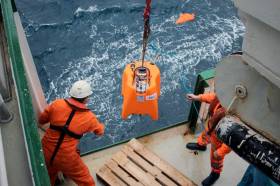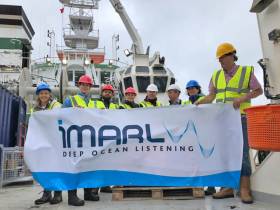Displaying items by tag: SEASEIS
Schools Encouraged To Engage With Science On New Atlantic Ocean Seismic Mission
#MarineScience - The new mission to Ireland’s offshore reaches to monitor seismic activity on the North Atlantic floor is to engage with schools while at sea.
As previously covered on Afloat.ie, scientists from the Dublin Institute for Advances Studies (DIAS) departed last Monday 17 September, on board the RV Celtic Explorer, for the three-week voyage that will see them deploy a network of 18 seismometers as part of the SEA-SEIS project.
Daniel Farrell is reporting on their work via the RV Celtic Explorer’s blog Scientists@Sea.
“I am looking forward to sharing first-hand what it’s like being on a research vessel such as the RV Celtic Explorer,” says Farrell, of CoastMonkey.ie and sponsored by DIAS and the Marine Institute.
“I have a passion for the sea, and will be filming the scientists, writing content for the blog as well as taking photos of all of the activities where everyone can keep up to date with what is happening.”
Students and teachers can engage with the mission through Farrell’s blog posts as well as with a range of resources and videos available on the SEA-SEIS website.
“The SEA-SEIS team have also organised a range of activities that both primary and secondary schools can take part in over the next couple of months,” Farrell adds.
“There are teaching resources and lesson plans from the Explorers Education Programme, as well as some great competitions involving a drawing competition and composing a rap song.”
New Project To Uncover Secrets Of Ireland’s Offshore Ocean Floor
#MarineScience - Researchers from the Dublin Institute for Advances Studies (DIAS) departed Cobh yesterday (Monday 17 September) on the RV Celtic Explorer with a mission to monitor seismic activity on the North Atlantic Ocean floor.
As Silicon Republic reports, the SEA-SEIS project will deploy 18 seismometers over the next three weeks to form a network that will cover Ireland’s offshore area.
These sensors will collect data over the next two years, measuring tiny vibrations from seismic and ocean waves that will inform 3D models to unveil the mysteries below the sea bed.
DIAS is partnering with the Marine Institute, Geological Survey of Ireland, Science Foundation Ireland and Irish Centre for Research in Applied Geosciences (iCRAG) on the SEA-SEIS mission that will use acoustic sensors developed by the iMARL deep ocean listening project.
“The geological evolution of Ireland’s offshore territory is fascinating, but there is still so much of it to be explored,” said Prof Chris Bean, a specialist in geophysics at DIAS.
He added the SEA-SEIS project means that for the first time “we will be able to make long-term direct observations of the interactions between our oceans and solid Earth in this region.”
Silicon Republic has more on the story HERE.






























































